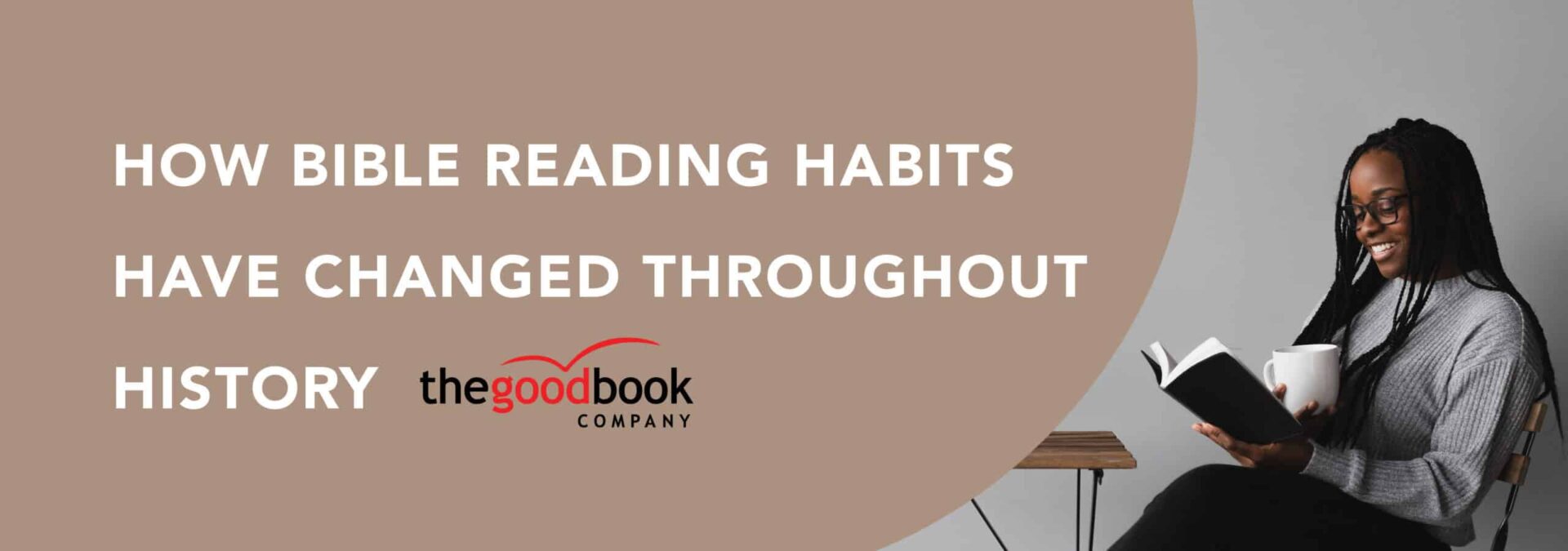This week the blog is sponsored by The Good Book Company, who publish biblical, relevant, and accessible resources like those recommended below.
For many of us who grew up in the evangelical world, it is taken for granted that Christians have a daily “Quiet time” — a few minutes put aside, usually at the beginning of the day, to read the Bible and pray in preparation for what comes next. And yet, historically, that is a relatively new practice.
How Daily Bible Reading Started
For the first 1500 years of the Christian church, access to Bible manuscripts was extremely limited. Hand-made copies were enormously expensive and incredibly valuable and rare. Few churches would have access to more than a portion of Scripture, and these were usually kept safely locked away in monastery scriptoriums and the libraries of the wealthy. And, of course, literacy was very limited. And the texts were only available in Greek, Hebrew, and Latin.
The stories and message of the Bible would only reach the masses through oral retellings of stories, passages, and sayings learned by heart from itinerant friars, ministers, and missionaries. Stories would be encapsulated in the stained glass of cathedrals, and paintings on the walls of churches.
Celtic missionaries would erect large stone crosses that can still be seen around Ireland today with images of Bible stories on them. These would serve as visual aids as they gathered people around them to tell them about the Son of God who came into the world for their salvation. But the Bible also became a prisoner of its messengers. Kept hidden, it was warped or selectively used to further the purposes of a church culture that had become self-serving.
Tyndale, Gutenburg, and Caxton changed all that. As the Bible was opened up in ordinary language for ordinary people to read, the shape and message of the gospel was rediscovered. The Reformation sparked revivals, and a hunger in ordinary people to learn to read so that they could drink in for themselves the life-giving words of Scripture, and think independently about the gospel message, rather than trusting what they heard via flawed human institutions. To actually own a Bible and read it for themselves was a gift more precious and liberating than they could imagine.
How Bible Reading Has Changed
I’m perhaps typical of my generation of Christian. Converted as a teenager, I was inducted into the practice of daily Bible reading as had been practiced by many previous generations of keen believers. There were great tools to help me. There was lots of encouragement. It was the one essential discipline of belonging to Jesus and the mark of whether you were truly saved.
Yet it was difficult. There was guilt when you missed a day; and frustration that it didn’t seem as fulfilling or rewarding as everyone said it should be. So, in line with the spirit of the age (it was the 70s), I defaulted to a much more laid-back attitude. I got exposure to the Bible at church, in Bible studies, and when I occasionally picked it up to read a favorite story.
Advantages: no guilt.
Disadvantages: I don’t think I was really engaging or growing spiritually, and my prayer life was lacking too (but that’s another story).
I suspect that this is how many others feel. A number of years ago, I produced a mini-survey sheet about Bible-reading habits that was used in a number of churches. The sheet had four quick-response questions that I encouraged ministers to hand to everyone and fill in during the service. (It took around 15 seconds to do.)
Most ministers were horrified by the result. Even in “right on” churches, the number of people actually engaging with God’s word in any significant way on a day-by-day basis was tiny – less than 10%. Recent statistics from both Barna and Lifeway suggest that this pattern is not untypical, and may even be declining further (though interestingly, lockdown experiences may have led more people to engage with the Bible).
Considering that everyday access to the Bible is a relatively recent part of the history of Christian spirituality, do we need to be concerned with a decline in daily Bible reading?
Do Bible-Reading Norms Need to Change Again?
It’s true that the pattern of a solo “quiet time” does not fit with everybody’s personality type. Nor is it mandatory by command of Scripture. What matters, surely, is that we are being regularly exposed to and reminded of God’s word so that we are encouraged to live for Christ day by day. That doesn’t have to be alone in your room at 6.30 am or whenever you wake up. It could be communally in a Bible study, or in conversation with other Christians: “What struck you recently that you’ve been reading or hearing about the Lord?”, or on audio on your commute.
But in our escape from sometimes unhelpful expectations, I fear we have lost the sense of both what a privilege it is to hear God speaking to us, and how vitally important it is for us to soak ourselves in God’s word so that we will be taught, corrected, and equipped to serve Christ (2 Timothy 3:16-17).
I don’t have to read the Bible … but I get to!
I don’t have to read the Bible … but if I truly want to serve Jesus, to be more like him, to live in a way that pleases him, engaging with God’s word is how the Spirit will transform us.
Where Change Might Begin
The irony is that we have never had more ways to engage with God’s word. The key is to:
- Find resources that work for you. Audio, print, or online – there are so many options for books that help you open up the Bible. If you can involve yourself in a way to connect communally all the better. The Good Book Company’s Explore notes have a lively Facebook page where people from around the world share questions, observations, and prayer requests daily as they interact with one another on the reading for the day.
- It’s quality, not quantity, that counts. Better to spend a few minutes thinking about a few verses, than to skim through pages without absorbing anything.
- Falling and failing: It’s inevitable that you will miss days or even weeks. Don’t be paralysed by guilt. Just remind yourself why it is good and great to have access to God’s word – and start again.
- It’s about developing a love relationship, not a law relationship. Don’t fall into the trap of thinking that “doing your quiet time” is an end in itself. The sign that your daily time with God is real is when you start to love him more and serve more wholeheartedly.
For 30 years The Good Book Company has published biblical, relevant and accessible resources that point to “the Good Book”, the Bible. And that’s still our mission today. To celebrate our anniversary, we’re offering 30% off a selection of books that encourage Christians of all ages to open up the Bible. So whoever you are, and wherever you are, open up the Bible and hear God speak.










